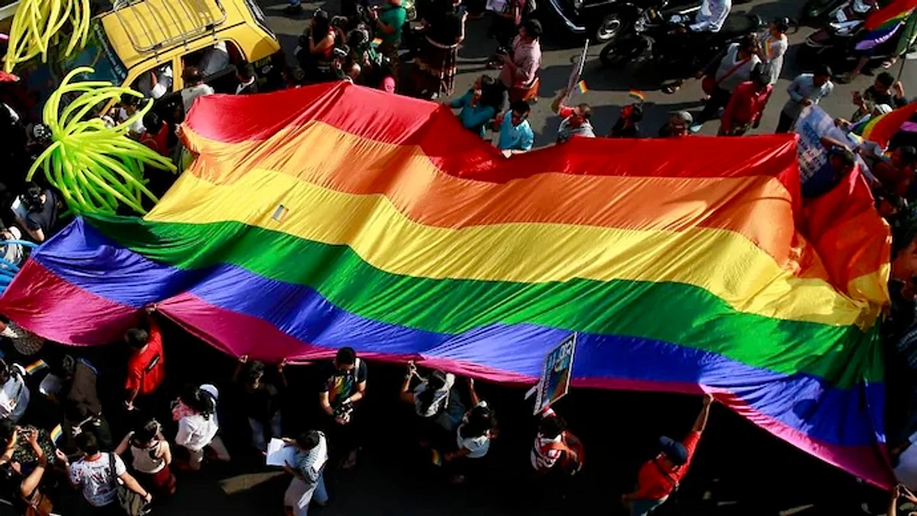
Copyright infringement not intended
Context: The Maharashtra government has expressed its inability to grant “additional reservations” to transgender persons in education and public employment, as per a clarification sought by the Bombay High Court.
Details
- The state’s Advocate General said that the existing reservations for various communities in India make it difficult to accommodate transgender persons’ demands.
- The struggle for horizontal reservation for transgender persons in India has been a long-standing one.

Reservation for Transgender
About
- Transgender persons are those whose gender identity or expression does not match their assigned sex at birth. They face discrimination, stigma, violence and exclusion from various spheres of life.
- To address these issues and ensure their rights and dignity, some countries have introduced reservation policies for transgender persons in education, employment, health care and political representation.
- Reservation is a system of affirmative action that aims to provide equal opportunities for historically marginalized groups in education and employment.
- In India, reservation is granted to certain castes, tribes, and religious minorities that are classified as socially and educationally backward classes (SEBCs). One such group that has been recognized as SEBCs by the Supreme Court of India is the transgender community.
Background
- The concept of reservation for transgender persons is based on the recognition of their historical and social disadvantages and the need to provide them with affirmative action to achieve equality and inclusion.
- Reservation policies are also in line with international human rights standards and the Sustainable Development Goals (SDGs) that aim to leave no one behind.
- The United Nations has adopted several resolutions and guidelines to protect and promote the rights of transgender persons, such as the; Yogyakarta Principles, the UN Human Rights Council Resolution 17/19, and the UN High Commissioner for Human Rights Report on Discriminatory Laws and Practices and Acts of Violence against Individuals Based on their Sexual Orientation and Gender Identity.
- In India, The first state to introduce reservation for transgender persons was Karnataka in 2021.
National Legal Services Authority of India (NALSA) v/s Union of India Case (2014)
- The most important judicial pronouncement on the rights of transgender persons in India is the National Legal Services Authority of India (NALSA) v/S Union of India (2014) case. In this case, a bench of the Supreme Court delivered a historic judgment that affirmed the constitutional rights and dignity of transgender persons.
- The judgment recognized that transgender persons have a distinct identity that does not conform to the binary gender norms of male and female.
- The court held that they have a right to self-identify their gender as a male, female, or third gender and that this right is protected under Article 21 of the Constitution, which guarantees the right to life and personal liberty.
- The judgment acknowledged that transgender persons face severe discrimination, stigma, and violence in society and that they are a socially and educationally backward class. It directed the central and state governments to take measures to protect their rights and welfare, including providing them with reservations in education and public employment.
Nature of reservation for transgender persons
- The NALSA judgment entitles transgender persons to reservations on constitutional grounds. It does not, however, mention the nature of reservations – whether they are to be vertical or horizontal.
- Vertical reservation refers to a reservation that is based on caste or tribe, such as for Scheduled Castes (SCs), Scheduled Tribes (STs), and Other Backward Classes (OBCs).
- Horizontal reservation refers to a reservation that is based on other criteria, such as gender, disability, or domicile. Horizontal reservation cuts across the vertical reservation, meaning that it applies to all categories of beneficiaries.
- The question of whether reservations for transgender persons should be vertical or horizontal has been debated by legal experts and activists.
- Some argue that it should be vertical, as transgender persons belong to different castes and tribes, and that they should be given a separate quota within each category.
- Others argue that it should be horizontal, as transgender persons face discrimination irrespective of their caste or tribe, and that they should be given a fixed percentage of seats across all categories.
The Supreme Court has not yet clarified this issue, leaving it to the discretion of the central and state governments. Some states, such as Tamil Nadu, Kerala, Karnataka, and Odisha, have already implemented horizontal reservations for transgender persons in education and employment. Others, such as Maharashtra, have proposed vertical reservations for them within the OBC category.
Significances
Enhance the access and participation
- Reservation policies enhance the access and participation of transgender persons in education, employment, health care and political representation, which are essential for their empowerment and well-being. Education can provide them with knowledge, skills and opportunities for personal and professional development.
- Employment can provide them with income, security and independence. Health care can provide them with medical and psychological support and care. Political representation can provide them with voice, influence and decision-making power.
Reduce the discrimination, stigma, violence and exclusion
- Reservation policies could reduce the discrimination, stigma, violence and exclusion that transgender persons face in various spheres of life, which are detrimental to their mental and physical health. By creating a more inclusive and supportive environment, reservation policies can help transgender persons overcome the barriers and challenges that they encounter daily.
- They can also help raise awareness and sensitivity among the general public and other stakeholders about the issues and needs of transgender persons.
Increase the visibility and recognition
- Reservation policies could increase the visibility and recognition of transgender persons as equal citizens and human beings, which fosters social acceptance and inclusion. By acknowledging and affirming their identity and existence, reservation policies can help transgender peoples gain respect and recognition from others.
- They can also help challenge the stereotypes and prejudices that often surround transgender persons and promote a more positive and accurate understanding of their diversity and complexity.
Contribute to the diversity and pluralism
- Reservation policies could contribute to the diversity and pluralism of society, which enriches the culture and democracy of the country. By bringing different perspectives, experiences and talents to the table, reservation policies can help transgender persons contribute to the social, cultural, economic and political development of the country.
- They can also help foster a culture of dialogue, tolerance and cooperation among different groups and individuals in society.
Empower transgender persons
- Reservation policies may empower transgender persons by providing them with opportunities for education, employment, health care, and political participation. These opportunities can help them develop their capacities, potential and aspirations. They can also help them exercise their rights, responsibilities and freedoms as citizens.
Challenges
May not reach all transgender persons
- Reservation policies may not reach all transgender persons, especially those who are marginalized due to their caste, class, ethnicity, religion or disability. These intersecting identities may create additional barriers and vulnerabilities for transgender persons, who may face discrimination and exclusion from both their communities and the dominant groups.
May not address all the barriers and needs
- Reservation policies may not address all the barriers and needs of transgender persons, such as legal recognition of gender identity, access to gender-affirming health care, protection from violence and harassment, etc.
- These issues require comprehensive and holistic interventions that go beyond reservation policies and recognize the diversity and dignity of transgender persons.
May face resistance or backlash
- Reservation policies may face resistance or backlash from some sections of society that oppose or misunderstand the rights and identities of transgender persons. These groups may challenge the legitimacy and validity of reservation policies, claiming that they violate the principle of merit or equality, or that they promote unnatural or immoral lifestyles.
May create stereotypes
- Reservation policies may create stereotypes or tokenism of transgender persons, who may be seen as beneficiaries rather than agents of change. Transgender persons may be reduced to their gender identity, ignoring their other skills, talents, and contributions.
- They may also face pressure to conform to certain norms and expectations of their reserved spaces and positions, which may not reflect their true selves or aspirations.
In addition to these challenges, there are also some practical difficulties that may hamper the implementation of reservation policies for transgender persons, such as:
- Legal and administrative hurdles, such as the lack of clear definitions and criteria for identifying transgender persons, the absence of legal recognition and documentation of their gender identity, and the complexity of implementing reservation across different levels and sectors of governance.
- Social and cultural barriers, such as the resistance and backlash from dominant groups who perceive reservation as a threat to their privileges and interests, the stigma and harassment that transgender persons may encounter in reserved spaces and positions, and the internalized oppression and low self-esteem that may affect their aspirations and performance.
- Economic and political constraints, such as the limited resources and capacities available for designing and monitoring reservation policies, the corruption and nepotism that may undermine their effectiveness and accountability, and the lack of political will and commitment to upholding reservation as a human rights obligation.

Way forward
- Reservation policies for transgender persons are a positive step towards ensuring their rights and dignity. However, they need to be complemented by other measures and actions that address the root causes and consequences of discrimination and exclusion.
- Creating awareness and sensitization programs for the general public, especially in schools and workplaces, to foster respect and acceptance of transgender persons and their identities.
- Providing legal and social protection to transgender persons from violence, harassment, and abuse, both in public and private spaces.
- Ensuring access to quality health care, education, employment, and social welfare services for transgender persons, without discrimination or stigma.
- Supporting the empowerment and participation of transgender persons in decision-making processes that affect their lives and communities.
- Promoting the recognition and documentation of transgender person's gender identity and expression, as well as their rights to change their name and sex marker on official documents.
By implementing these measures, we can create a more inclusive and equitable society for transgender persons and other marginalized groups. Reservation policies are not a panacea, but they are a necessary and effective tool to address the historical injustices and systemic barriers that transgender persons face. They are also a way of affirming the value and dignity of transgender persons as human beings and citizens.
Must-Read Articles:
Horizontal Reservation: https://www.iasgyan.in/daily-current-affairs/horizontal-reservation
Reservation System: https://www.iasgyan.in/daily-current-affairs/reservation-system
|
PRACTICE QUESTION
Q. Reservation for transgender people in government jobs and educational institutions is a contentious issue that has been debated for a long time. What are the significances of providing equal opportunities and representation to the transgender community? What are the challenges and drawbacks of implementing such a policy? How can the government and society address these challenges and ensure a fair and inclusive way forward for all?
|
https://indianexpress.com/article/explained/explained-law/transgender-demand-horizontal-reservation-explained-8694004/















